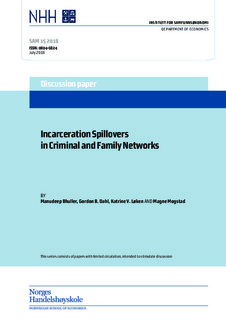| dc.contributor.author | Bhuller, Manudeep | |
| dc.contributor.author | Dahl, Gordon B. | |
| dc.contributor.author | Løken, Katrine V. | |
| dc.contributor.author | Mogstad, Magne | |
| dc.date.accessioned | 2018-08-22T14:27:11Z | |
| dc.date.available | 2018-08-22T14:27:11Z | |
| dc.date.issued | 2018-08 | |
| dc.identifier.issn | 0804-6824 | |
| dc.identifier.uri | http://hdl.handle.net/11250/2558927 | |
| dc.description.abstract | Using quasi-random assignment of criminal cases to judges, we estimate large incarceration spillovers in criminal and brother networks. When a defendant is sent to prison, there are 51 and 32 percentage point reductions in the probability his criminal network members and younger brothers will be charged with a crime, respectively, over the ensuing four years. Correlational evidence misleadingly finds small positive effects. These spillovers are of first order importance for policy, as the network reductions in future crimes committed are larger than the direct effect on the incarcerated defendant. | nb_NO |
| dc.language.iso | eng | nb_NO |
| dc.publisher | Institutt for samfunnsøkonomi, NHH | nb_NO |
| dc.relation.ispartofseries | DP SAM;15/2018 | |
| dc.subject | Incarceration, peer effects, criminal networks | nb_NO |
| dc.title | Incarceration Spillovers in Criminal and Family Networks | nb_NO |
| dc.type | Working paper | nb_NO |
| dc.subject.nsi | VDP::Samfunnsvitenskap: 200 | nb_NO |
